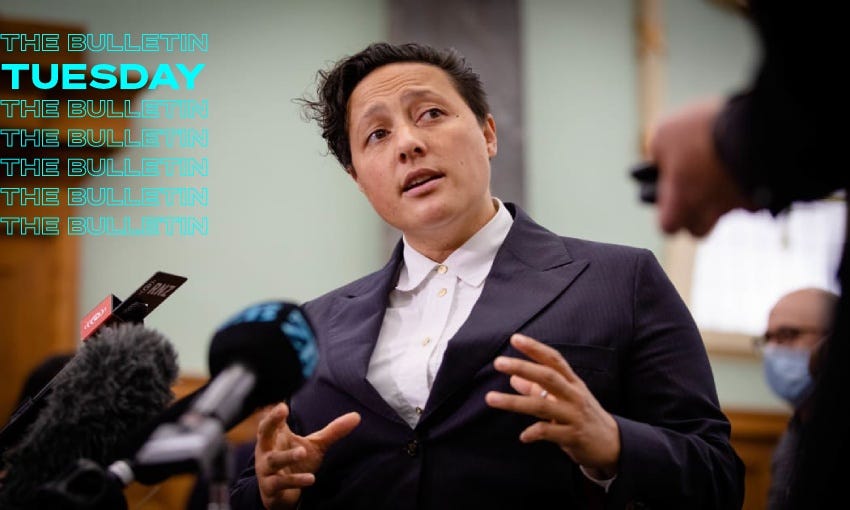Political donation rules to change before election
The Green party doesn’t think they go far enough, National has called the possible effects “chilling” and Act says Labour is damaging democracy. But what about the “cash for the access” get-around?
Mōrena and welcome to The Bulletin for Tuesday, June 28, by Anna Rawhiti-Connell. Presented in partnership with Z Energy.
In today’s edition:
Kiri Allan announces rule changes will be in place before 2023 election. (Photo: RNZ/Angus Dreaver)
Donate more than $5,000 to a political party and your identity will be disclosed
Newly minted justice minister Kiritapu Allan has announced that the rules governing political donations and overseas voting will be changed before the next election. The Electoral Amendment Bill would require the identity of donors of more than $5,000 to be made public –down from $15,000. It comes on the same day as closing arguments were delivered in the High Court in the fraud case against two men around donations to the NZ First Foundation. A ten-week trial will start on July 25 involving three people accused of electoral fraud in relation to donations made to both the Labour and National parties.
Political preference of donors should be kept private, just as voting is, says National
The National party has warned that the donation rule changes could have a “chilling effect on democracy”. It released its submission on the changes last week. It says officials have underestimated “the aversion of donors to being publicly identified”, and the political preferences of donors should be kept private, just as voting is. It is also concerned about the chages as a step towards dependence on state funding for election campaigns. Jim Bolger mooted a move to public financing of campaigns in 2019 in the wake of the initial revelations about the NZ First Foundation case. Act leader David Seymour responded to yesterday’s announcement saying “There is no evidence that $15,000 donations are distorting politics in any way.” Electoral law experts think the changes are an improvement but don’t fulfil expectations around transparency and improving voters’ trust and confidence.
Cash for access outside scope of reform
Stuff’s Andrea Vance has taken a look at one mode of fundraising that may escape reform. “Cash for access” fundraisers, where people pay high prices for attendance at private events with prime ministers, ministers or leaders, have been noted in party newsletters and media releases dating back to 1995, according to this 2014 report, also from Vance. The use of the phrase “cash for access” in that report was in reference to a particularly ropey Question Time where both Labour and National were making accusations about these kinds of fundraisers. Bryce Edwards writes that the government has kept this issue out of the terms of reference for the reform and that “closing this loophole is not in the interests of any political party that has ministers or wants to have ministerial roles in the future”.
Temporary fix applied to overseas voting rules
In acknowledgement of the barriers to returning home, especially amid Covid travel uncertainty, the government has also temporarily extended the voting eligibility criteria for those overseas from three to six years for citizens, and from one to four years for permanent residents. New Zealanders overseas have been waiting for this fix for quite some time, with some unable to vote in the 2020 election because of the border closure. The Green party is disappointed that it hasn’t been extended beyond the 2023 election. Green MPs have previously pointed out that Canadians and Americans abroad keep their voting rights forever and British citizens can spend 15 years away before they are disenfranchised. Last year, law professor Andrew Geddis called the overseas voting rules arbitrary and stupid.
Stocktake is The Spinoff’s new weekly business newsletter. Delivered to your inbox every Tuesday and produced in partnership with Kiwibank, Stocktake will feature the people behind the businesses driving Aotearoa and insight on how the forces affecting the economy will impact the lives of New Zealanders.Sign up to Stocktake and go in the draw to win one of three prize packs from one of our favourite business success stories, Fix and Fogg. Two subscribers will receive a six-month supply and one lucky winner a full year’s supply of Fix and Fogg’s delicious nut butters.
Abortion debate hits home
It is sometimes suggested that the best course of action for politicians with regards to Twitter is “don’t tweet”. You could extend that to Facebook posting. As the news of Roe v Wade being overturned broke over the weekend, Nanaia Mahuta condemned the US Supreme Court decision on Twitter, calling it “draconian”. In yesterday’s post cabinet press conference Grant Robertson was asked whether this was hypocritical given Mahuta did not vote in favour of removing abortion from the Crimes Act in 2019. Robertson said he would not speak on behalf of Mahuta. Robertson made comments earlier in the day about Christopher Luxon’s stance on abortion, which Nicola Willis said was an irresponsible attempt “to import US-style culture wars into New Zealand”. Meanwhile, Luxon’s instruction to MP Simon O’Connor that he delete an insensitive Facebook post has drawn criticism from former National MP Alfred Ngaro. In productive news, Family Planning had the biggest surge in membership numbers in its history in the 48 hours after the Roe v Wade news broke.
Changes to NCEA to be announced this week
Newsroom’s political editor Jo Moir has spoken to associate education minister Jan Tinetti ahead of expected announcements about changes to NCEA this week. In the recent cabinet reshuffle, Tinetti picked up more responsibility within the education portfolio as Chris Hipkins was made police minister. Tinetti already had oversight of learning support, the curriculum refresh, NCEA changes and the attendance and engagement strategy. The reshuffle sees her taking up responsibility for schooling network and operation decisions and Tomorrow’s Schools reforms. Of the coming changes to NCEA, the government says it is looking to reduce the workload of teachers. The Invercargill Primary Principals Association recently published an open letter to Hipkins calling for a two-year halt to this “incessant change” to allow teachers to help students catch up.
A vital message from The Spinoff’s publisher, Duncan Greive:
If you’re reading this, you’re hopefully getting value out of The Spinoff. Yet like many publishers, we’ve suffered a significant drop in members, despite our costs continuing to increase. On one level I understand why our membership has dropped away. As the cost of living has reached new heights and the pandemic has become less of an urgent news event and more of a part of day-to-day life, it’s totally normal to feel like you don’t need to support your local media organisation.
The promise we’re making to you is that we’re actually better suited to times like this than the pandemic itself. Of course we will continue to write about Covid-19 and the many effects it’s having on society, but our plan now is to return to something more of what made us, which is coverage of culture, politics, business, te ao Māori and more with heart and humour.
But we can’t do it without you. We need your support more than we ever have. So please, if you can, click here to support The Spinoff by becoming a member today.
Body corporate rules about social housing could be tested
The Herald has a report this morning about alleged discrimination against tenants who may be renting in apartments via a social housing scheme. An Auckland apartment owner rented his apartment to an Auckland City Mission client. The rent is being paid by a social service housing provider. The body corporate at the apartment complex has said renting "for the purpose of community housing, a half-way house, Housing New Zealand tenancies or any similar housing" is a breach of the body corporate rules and wants the tenant evicted. A manager at the letting agency who rented the apartment out said the policy was discriminatory against people who were unemployed or receiving benefits, and potentially in breach of the Human Rights Act. Head of tenancy services for the ministry of business and innovation, Steve Watson said while unit owners and occupiers were required to comply with body corporate operational rules, those rules could be invalid if they were not consistent with New Zealand laws.
Got some feedback about The Bulletin, or anything in the news? Get in touch with me at thebulletin@thespinoff.co.nz
Furious about the state of reproductive rights in the US but don’t know quite what to do about it? Here are some ideas – and here's Dame Margaret Sparrow on what the overturning of Roe v Wade means for New Zealand. Duncan Greive writes about the incredible impact of the pandemic on TV audiences (with graphs!). Tara Ward talks to infomercial queen Suzanne Paul about ditching telly for the greener pastures of social media with her latest business venture. And photographer Edith Amituanai captures the Tongan pride in Ōtāhuhu and Penrose before and after the rugby league test on Saturday.
New Zealander Ruth Croft wins “the toughest foot race in the world”
The Bounce’s Dylan Cleaver has a run down on New Zealander Ruth Croft winning the Western States, an ultramarathon described as “the toughest foot race in the world”. Croft won the race over the weekend, finishing the 100 mile race in 17 hours, 21 minutes and 30 seconds. My only relative data point for comparison is my half-marathon time but it’s not worth mentioning as I would simply collapse mere (and early single digits) hours into attempting this race in which temperatures get to 40 degrees and the elevation reaches 5486m. Cleaver points to a longer read on this race on Outside which I also recommend for a sense of exactly what Croft has achieved. It ends with a quote from one participant who says “I'm reluctant to boast about having done this. It's kind of like telling people you beat yourself at night with chains.”
The final frontier at home
On Friday, the University of Otago’s foreign policy school launches and this year’s theme will tackle the final frontier, space. The school will focus on the regulatory, scientific, cultural, and security aspects New Zealand must consider when moulding its space policy and framework. For a feature today, I’ll point you to Don Rowe’s piece for New Zealand Geographic on Rocket Lab and the appeal of New Zealand’s geography for launching rockets.











